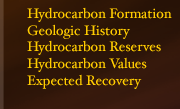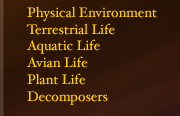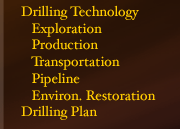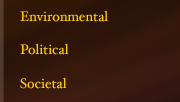
Societal Implications - Native Alaskans
Importance of the Environment
The subsistence strategy of both the Inupiat and Gwich'in depends on the environment. The Inupiat of Kaktovik rely primarily on the sea for their diet, whereas the Gwich'in diet is based primarily upon the Porcupine Caribou and other land species.
Oil Drilling
The majority of Kaktovik Inupiat support drilling. They believe drilling, the revenues associated with it, and the influx of people will improve schools and health care, and create jobs.
The Gwich'in are strongly opposed to drilling in ANWR. "'In 1988, our people became aware of oil companies trying to gain access to the coastal plain of the Arctic National Wildlife Refuge. Oil development there would harm the caribou and threaten our future. So we gathered for the first time in over a hundred years in Arctic Village. The Gwich'in Nation was reborn. Everyone spoke resolutely about how important the caribou are to our culture. At the end of the gathering, we spoke with one voice, one mind and one heart with a renewed commitment to protect our way of life for future generations. We came up with the Gwich'in Nintsyaa-a unified standing resolution calling for permanent protection of the Porcupine Caribou Herd birthplace. The Gwich'in Steering Committee was created." (Faith Gemmil)
Economy and Employment
The Inupiats of Kaktovik need an outside source of employment to bolster their economy and provide them with the funds to improve their living conditions and support technology-enhanced subsistence. Kaktovik does not currently have sanitation facilities, and the unemployment rate is 15.8% (about 10% above the national average), but 27.4% of the eligible workforce is not seeking employment. More drilling in Alaska would result in higher yields from the Alaska Permanent Fund Dividend Program, giving the Inupiats and all Alaskans more purchasing power. The Inupiat native corporation, Arctic Slope Regional Corporation, would increase in value and thereby increase the value of the Inupiat shareholders' stocks if their corporation were to become involved in the drilling process. These jobs, however, would not be permanent, and the economy of Kaktovik would not be stable in the long run.
The Gwich'in also suffer from a high unemployment rate (16.7% in Arctic Village, 36.2% in Venetie, 18.0% in Fort Yukon, and 0% in Chalkyitsik). The percent of natives not seeking employment is also higher in Kaktovik villages (26.3% in Arctic Village, 52.1% in Venetie, 35.6% in Fort Yukon, and 63.8% in Chalkyitsik). More jobs would be available if drilling were to begin in ANWR, but it is uncertain if the Gwich'in would take these jobs. More drilling in Alaska would result in higher yields from the Alaska Permanent Fund Dividend Program, giving the Inupiats more purchasing power. If Doyon Drilling, the Gwich'in regional drilling corporation, became involved in the drilling process, then Gwich'in shareholders' stocks would increase.
Rights of the People
The International Porcupine Caribou Commission [IPCC] (comprised of Venetie, Fort Yukon, and [Inupiat] Kaktovik in Alaska; and Old Crow in the Yukon Territory.) formed to address the rights of Alaskan natives. The IPCC's major joint statement is, "In no case may a people be deprived of its own means of subsistence." A large scale impact to the Porcupine Caribou herd from drilling in ANWR is a threat to the Gwich'in means of subsistence.
Summary of the Inupiat of Kaktovik Perspective
The Inupiat primarily subsist on marine mammals and fish and use land mammals and fowl to supplement their subsistence. While the Inupiat are concerned with the caribou, adverse effects on the Porcupine Caribou herd from drilling would not destroy their subsistence strategy. Instead, the Inupiat Eskimos of Kaktovik are in need of jobs due to the high cost of living and higher than average unemployment rates. Drilling would be the mechanism to revitalize their economy by providing jobs, revenues for sanitation services, increasing their yearly dividends through the Alaska Permanent Fund Dividend Program, and increasing the value of their shares in Arctic Slope Regional Corporation if the corporation is involved in the drilling process. The majority of Kaktovik Inupiats embrace drilling in the 1002 area as long as the drilling is onshore (Drilling offshore would adversely affect their subsistence strategy because the noise from rigs and seismic exploration is proven to deter bowhead whales within a 20 mile radius.).
Summary of the Gwich'in Perspective
The Athabascan Gwich'in (Caribou People) do not as a whole support drilling in the 1002 area as shown through the Gwich'in Steering Committee. They feel that enough research exists to substantiate the claim that oil drilling displaces calving caribou, and if the caribou (their main source of subsistence) are displaced from their prime feeding ground, the herd will dwindle and subsequently the Gwich'in population's food source will decrease. According to the resolution formed by the International Porcupine Caribou Commission, "In no case may a people be deprived of its own means of subsistence." The Gwich'in could benefit from oil drilling through seasonal work, increased dividends from the Alaska Permanent Fund Dividend Program, and if their drilling corporation, Doyon Drilling, Inc., drilled in ANWR, Gwich'in stocks in Doyon would increase from oil revenues. However, the Gwich'in do not value these economic incentives for drilling as much as they value keeping their subsistence strategy and culture intact.





